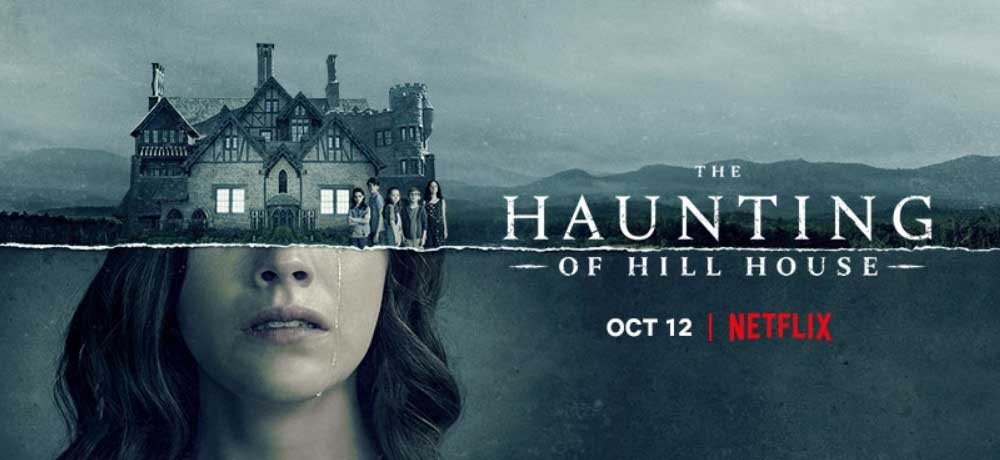
I don’t know precisely what I expected when Dawn insisted on watching Netflix’s latest binge-a-thon offering, The Haunting of Hill House. Probably not much. Shirley Jackson’s 1959 novel of the same name has been adapted several times over the years, to varying degrees of success, and so I think I greeted another telling of it with the same amount of enthusiasm I greet the announcement of another Sherlock Holmes or Robin Hood show. Again, probably not much. Ho hum, Halloween is around the corner so everyone wants their scare fix, no matter how mediocre it might be.
But our apartment is small and I can see our television from my computer, so whatever Dawn happens to be watching is something I’m at least half-watching whether I feel like it or not. By the end of the first episode, it was clear to me this was not going to be a “half-watch” scenario. By the end of this past weekend, we’d binged through to the end, in part because I figured I needed to write about it for this blog and for once I was going to base my impressions on the whole damn package rather than a handful of initial episodes. I’ve had a few times over the years where that early enthusiasm and resulting glowing recommendation didn’t pan out in the final tally.
This series gets my unreserved recommend from start to finish. It is exceedingly well-crafted in all aspects of its design, from actor performances to set design to the script and camera work. It is a more subtle and patient work than much of its genre and has been compared to a family drama that happens to have ghosts in it. And in this man’s opinion, that totally works. I’ve talked in this very space about an arguable character flaw of mine where I can get bored of drama that’s too grounded in reality. Give me some fantastical elements with which to play out the metaphors and foibles of interpersonal relationships. This show provides that. Oh boy howdy does it ever. And for that matter it’s a damn good and at times damn scary ghost story precisely because it hews so closely to studies of character and makes you care. These aren’t just the nigh-interchangeable victims of your average “evil house” lock-in. Actually you learn early on that showrunner (and director of all 10 episodes!) Mike Flanagan has remixed the foundations of Jackson’s novel in a… well, very novel way, because there’s no (well, almost no) lock-in at all. Gone is the literal claustrophobia and isolation that’s become such a staple of ghost and monster stories, including previous adaptations of this story. In its place is something far, far more unsettling.
The most insidious thing for me about the new Haunting of Hill House is how aggressively normal a lot of the settings are presented, including the House itself. Rather than detracting from the horror, though, it emphasizes it because by the time you’re a few episodes in the message is loud and clear: nowhere is safe. Not your home, not your office… fear will follow you into the most mundane places. In part this is framed by the show as being because there is no getting away from your own mind, but also in part the show is very clear that this is not just a matter of hallucinations and hysteria. There are ghosts — and while their influence is strongest within the House itself, they are not confined to it. They will manifest to sensitive and skeptic alike, and can only be explained away for so long before they must be confronted. Don’t be so complacent just because the lights are on… they can go out at any time. Or perhaps worst of all, won’t go out, and you’ll be denied even the fleeting succor of not clearly seeing what’s in front of you.
That’s not the only horror trope subverted, inverted and otherwise manipulated in the course of the series. There are a few jump scares and moments of gore, but parceled out sparingly enough that they retain their impact when they happen. The jump scares don’t happen when you expect, for one thing. Flanagan is both a lifelong horror fan and a skilled director and you can tell he really went all out with this project as both a love letter to the genre and a gentle deconstruction, but the kind of deconstruction that’s more of a back-to-basics, “this is why we have always been fascinated by ghost stories” reminder.
Now there’s more I could say but it would be edging into spoiler territory, so again I just leave you with my recommend, and a warning that once you’ve watched all the way through, you may need to watch again. Let’s just say that if Hill House seems underpopulated with supernatural manifestations (save for a few very noteworthy exceptions), you just weren’t looking hard enough.








